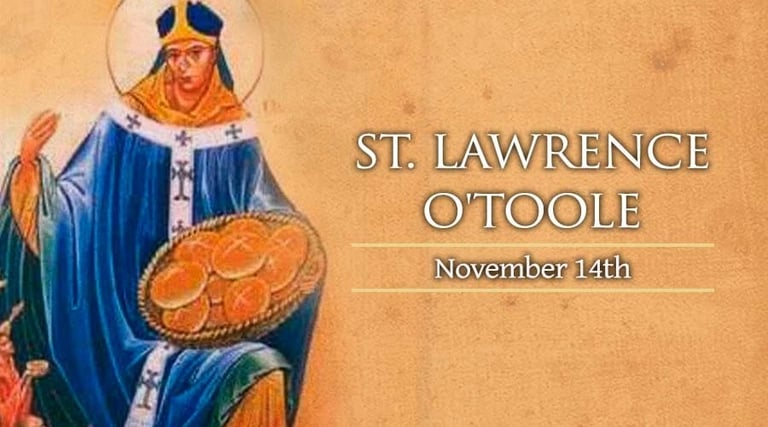Saint of the day November 14, 2024
St. Lawrence O'Toole
DAILY SAINT
Nirmala Josephine
11/14/20243 min read


St. Laurence O’Toole was the archbishop of Dublin, Ireland, and a great force for peace during a tumultuous time.
He was born in 1128 and named Lorcán Ua Tuathail (his name is anglicized to Laurence O’Toole). He was the son of Murtagh, the chieftain of the Murray clan. When a neighboring king invaded, Murtagh was forced to give up Laurence, who was only ten years old, as a hostage.
For two years, Laurence lived in a barren and stony region and was poorly treated. When Murtagh heard of this, he threatened vengeance unless the boy was handed over to the Bishop of Glendalough. Laurence was delivered to the bishop, and Murtagh hurried to visit him there. In thanksgiving, Murtagh vowed to God that one of his four sons would serve the Church. He asked the bishop to cast lots to decide which son should join him, but Laurence laughed and told him not to bother—he had already decided to do so.
Laurence was raised and educated by the bishop, and when he turned twenty-five, he was asked to be the Abbot of Glendalough Abbey. Laurence was a charitable and wise leader. When a famine struck the area during his first four months as abbot, he generously supported the villagers with extra food from the abbey.
Outlaws and robbers hid in the hills surrounding Glendalough and often threatened anyone who traveled through them. Laurence boldly spoke out against these robbers, and they responded to his rebukes by spreading lies about him. Laurence responded to the slander with silence, content to let the truth bear itself out.
When the archbishop of Dublin died in 1161, Laurence was elected to replace him, his election was supported by the High King and the community of Glendalough, but also warmly welcomed by the population of Dublin itself. Laurence’s first plan of action in the city was to reform the clergy who worked with him in Dublin. Laurence asked the clergy to truly commit to a life of regular prayer and fasting, and he led the clergy in these disciplines with his own example—he wore a religious habit, ate with the clerical community in a common dining area, and observed hours of silence and vigil prayer. Every day, Laurence shared a meal with the poor and destitute of Dublin, and he sustained many others by paying for their housing.
Various Irish kings and chieftains allied with the Norman King Henry II of England and conspired to seize Dublin. The citizens of Dublin begged Laurence to parlay with the Norman troops for them, but Laurence was unable to prevent the Normans from entering the city. He did, however, succeed in stopping the massacre of Dublin citizens the Norman knights were beginning to carry out. In the ensuing years of political turmoil, Laurence continued to negotiate between the Normans and the Irish chieftains.
During one trip to England, Laurence visited the tomb of St. Thomas Beckett, who was murdered for disagreeing with the king and honored as a martyr. The next day, as Laurence was celebrating Mass, a man attending Mass thought Laurence would inspire the people as a martyr as well, and struck him on the head. Laurence fell to the ground, and the horrified congregation thought he had died. When Laurence regained consciousness, however, he washed the wound on his head, bandaged it, and continued with Mass. The man who struck him was sentenced to hang, but Laurence asked for his pardon and saved his life. (Seven hundred years later, when Laurence’s relics were examined, his skull carried the mark from this blow.)
Laurence fell sick while traveling to England to meet with Henry II and returned to Ireland in very critical condition. Before he died, Laurence was asked what he wanted to leave to his heirs in his will, and he replied, “God knows I have not a penny in the world.” Laurence had truly embodied the care and stewardship of a shepherd and had given all he had to his beloved people of Dublin. Laurence died on November 14, 1180. He was canonized in 1225 by Honorius III.
Reflection
Saint Laurence O'Toole is remembered as martyr for both God and country having been sent as envoy for the Irish High King, Ruaidri O'Connor to King Henry II, and negotiated the Windsor Treaty on October 6, 1175. This was a mission that required high qualities of skill and statesmanship, where the contracting parties represented the feudal system as opposed to Irish law and custom. After a stay at the Monastery of Abingdon south of Oxford, he went to Normandy and the Abbey of Saint Victor at Eu. There, he was attacked while saying Mass, receiving a fatal blow to the head and the crown of martyrdom. He worked most of his life for the Church Reform Movement of the 12th Century. He was known for his profound sanctity and charity for those under his care.
Just as St. Lawrence spent much of his time interceding and negotiating, we too, are called to negotiate for peace and intercede on behalf of others in prayer. May we always seek to do our part to bring peace where there is strife and send up our intercessory prayers for others, calling on our Father to help us.
